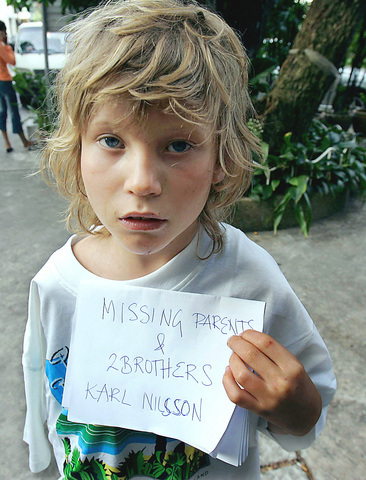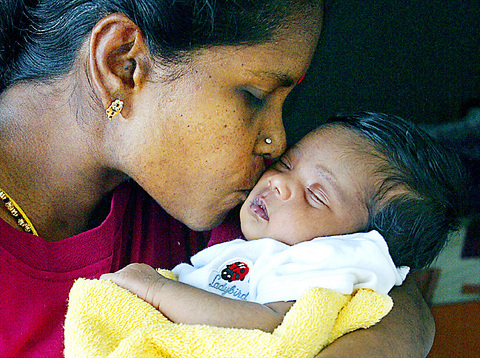NAGAPPATTINAM, India
Fisherman G.M. Veerappan and three of his children survived the tsunami by clinging to the remnants of his demolished home: a pole stuck in the ground.

PHOTO: AP
"My eldest daughter climbed on my back. I took the younger two in my arms and climbed onto the lone pole that remained after our house was destroyed," he said.

PHOTO: AP
As the water roared around him, Veerappan clung on desperately. But the fierce waves pounded against him, pummeling him with debris.
"There was no proper grip and I was slipping. After one hour, I lost all strength and dropped the two younger kids. I cried and cried, thinking I had killed my children," he said, shuddering at the memory.
After a few hours, rescuers reached Veerappan, and pulled the father and his 6-year-old daughter to safety as the waters began to recede.
When Veerappan came ashore, rescuers told him they had also found his two younger sons, ages 4 and 2. Unconscious and barely breathing, they had been discovered at the water's edge, half buried under sludge.
The family, now reunited, is staying at a makeshift shelter at a marriage hall. His wife and two other children were safe at a relative's home.
"Nobody can explain how my children survived," he said. "I am still wondering why God chose to save my children when he chose to let so many other children die."
PORT BLAIR, India
At 80 and with a career in the British colonial army and India's military behind him, Sheetla Prasad thought he was through with marches.
Then on Sunday, as Prasad was having tea with his wife, his tea cup began shaking -- and the Asian tsunami sent him on a backbreaking trek for survival in India's remote Campbell Bay islands.
"It was like the old days, in the army -- but my body was not the same. I thought I would die," said Prasad, a frail man with thick white stubble.
When he saw the sea roaring toward him, he shouted at his wife, two daughters-in-law, and three grandchildren to run uphill. He grabbed a machete and a few precious possessions and followed them up.
Within minutes, the waves had flattened his home, and he faced a stark choice: Die there with his family, or lead them through mountains covered in thick, dark foliage.
"I used my machete. I started hacking the bushes. I didn't even look back to see if my house was there or gone," he said at a relief camp in Port Blair, the territory's capital, his family at his side.
For two nights, the family took shelter in the huts of farm workers. On the third day, they dragged themselves through the forest, walking more than 10 miles with blistered feet.
They stopped only to have fruit plucked from trees, coconuts and water from natural sources.
On the third evening, they reached the docking site of a relief ship.
PENANG, Malaysia
When the waves hit, the baby girl's parents were flushed out of the restaurant they owned on the beach of this northwest Malaysian resort.
Suppiah Tulasi, not yet a month old, had been taking a nap when the calamity struck. She was found hours later floating on a mattress inside the restaurant.
"We know this was a real miracle, thanks to God," said her mother, Annal Mary. "So many other children who died, but our baby was OK. She could have been swept out to the sea."
Mary and her husband found Tulasi when they swam back into the wrecked restaurant.
The parents, who have lived by the sea their entire lives, said they have no plans to move.
BANDA ACEH, Indonesia
After the waves swept him up, 10-year-old Ardiyansah found himself on top of a tree.
His tale of survival is also one of heartbreak.
"The last thing I saw was my mother drowning while crying out my name, and I didn't even see my little sister," said the boy, who had bruises on his knees but was otherwise uninjured.
Ardiyansah spent two hours in the tree waiting for water to recede. A man arrived and helped him down.
The boy then started searching for his father, staying at the houses of strangers. After three days, they found each other.
The father said the boy had a vision of his mother after her death and couldn't sleep until a Kpran was put under his pillow.
Ardiyansah comes from Lampu Daya village, the most populated housing area in Banda Aceh. Only about 20 percent of the people in the neighborhood survived. Of the boy's 60 schoolmates, only four are still alive.
PHUKET, Thailand
When the raging waters subsided, 7-year-old Karl Nilsson thought he had been transported to another city. And when he looked around, the parents and two brothers who had been with him moments before had vanished.
Now Kalle, as everyone calls him, is being cared for by another Swedish family. His parents and two brothers were among the more than 1,500 people killed when the tsunami lashed this resort.
"All night, when he heard the noise of a truck or car, Kalle woke up and asked me, `Is it another wave coming?"' said Marie Guldstrand, a Swedish doctor who has been taking care of Kalle since she and her family found him in a Buddhist temple where survivors had sought shelter.
Kalle, wearing only underwear, was suffering from a broken collar bone, bruises and cuts. He screamed as a medical worker stitched cuts on his feet without an anesthetic.
When the tsunami struck, Kalle was in a hotel room with his two brothers -- Olof, 5, and Vilgot, 3. His parents, Thomas and Asa, were outdoors.
Suddenly a torrent of water surged into the room.
"He told me, `I was under the water but somehow I could breathe. I was just closing my eyes and moving with the waves. Then, suddenly the flood ended and I was in another city,'" Guldstrand said.
He wandered around by himself and was eventually helped by some Thais and a Swedish couple who took him to the temple.
COLOMBO, Sri Lanka
Fisherman Sini Mohammed Sarfudeen clung to his capsized boat for three days after the tsunami struck. He was rescued when the crew of a Sri Lankan air force helicopter spotted him at sea.
The aircraft had been on a mission to drop food to 300 people cut off by floodwaters when its crew noticed him hanging onto his boat off Kalmunai, 200km east of the capital, Colombo.
"He told us that since Sunday he had been floating in the sea," Group Capt. Ajantha De Silva said. "His condition was bad."
Sarfudeen was taken to the hospital in Kalmunai, where many people flocked to the beach to watch the rescue.
"It was good to see that the man had the will to live, and this is what saved him," said Dr. Fazlul Rahman.
MALE, Maldives
Mike Rigg, a construction worker from Liverpool in Britain, was surfing off the resort of Lohifushi in the Maldives when the tsunami hit.
"Suddenly there was a 2m-high surge in the waves and a very powerful current started rushing along the island," said Rigg, 33. "I was dragged along with it but I managed to stay out of the middle of the current. I thought the main thing was fighting to stay out of the middle."
Rigg was carried along for about 50m before he found the water had become shallow enough for him to stand, and he battled his way to shore.
He said the incident happened too quickly for him to be frightened.
"In a situation like that you just concentrate on doing what you have to do to get out of it," he said.

Kehinde Sanni spends his days smoothing out dents and repainting scratched bumpers in a modest autobody shop in Lagos. He has never left Nigeria, yet he speaks glowingly of Burkina Faso military leader Ibrahim Traore. “Nigeria needs someone like Ibrahim Traore of Burkina Faso. He is doing well for his country,” Sanni said. His admiration is shaped by a steady stream of viral videos, memes and social media posts — many misleading or outright false — portraying Traore as a fearless reformer who defied Western powers and reclaimed his country’s dignity. The Burkinabe strongman swept into power following a coup in September 2022

‘FRAGMENTING’: British politics have for a long time been dominated by the Labor Party and the Tories, but polls suggest that Reform now poses a significant challenge Hard-right upstarts Reform UK snatched a parliamentary seat from British Prime Minister Keir Starmer’s Labor Party yesterday in local elections that dealt a blow to the UK’s two establishment parties. Reform, led by anti-immigrant firebrand Nigel Farage, won the by-election in Runcorn and Helsby in northwest England by just six votes, as it picked up gains in other localities, including one mayoralty. The group’s strong showing continues momentum it built up at last year’s general election and appears to confirm a trend that the UK is entering an era of multi-party politics. “For the movement, for the party it’s a very, very big

A new online voting system aimed at boosting turnout among the Philippines’ millions of overseas workers ahead of Monday’s mid-term elections has been marked by confusion and fears of disenfranchisement. Thousands of overseas Filipino workers have already cast their ballots in the race dominated by a bitter feud between President Ferdinand Marcos Jr and his impeached vice president, Sara Duterte. While official turnout figures are not yet publicly available, data from the Philippine Commission on Elections (COMELEC) showed that at least 134,000 of the 1.22 million registered overseas voters have signed up for the new online system, which opened on April 13. However,

ENTERTAINMENT: Rio officials have a history of organizing massive concerts on Copacabana Beach, with Madonna’s show drawing about 1.6 million fans last year Lady Gaga on Saturday night gave a free concert in front of 2 million fans who poured onto Copacabana Beach in Rio de Janeiro for the biggest show of her career. “Tonight, we’re making history... Thank you for making history with me,” Lady Gaga told a screaming crowd. The Mother Monster, as she is known, started the show at about 10:10pm local time with her 2011 song Bloody Mary. Cries of joy rose from the tightly packed fans who sang and danced shoulder-to-shoulder on the vast stretch of sand. Concert organizers said 2.1 million people attended the show. Lady Gaga